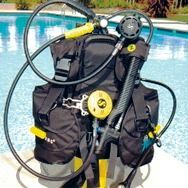Private Scuba › Diving › Articles › SCUBA
SCUBA Certification Limitations
SCUBA is the slang word meaning an aqualung or apparatus used by recreational divers. The SCUBA acronym stands for 'Self Contained Underwater Breathing Apparatus'.
The diving unit provides the diver with a portable supply of compressed air from which to breathe during submersion.
A scuba certification allows for independent diving within certain limitations.
World Scuba Certification Limits
From the young age of eight years old anyone who is in general good health and comfortable in the water can try diving.
All the major dive training agencies offer a complete range of experience programs and certification courses that allow divers to visit some of the best dive sites in the world.
Discovery programs generally have limitations to deepest depths and supervisory restrictions. Maximums range from a few meters for children, six meters in confined water for some programs, and 12 meters for most introductory courses.
Certified divers with a scuba diving license are allowed to dive independently of an instructor within certain restrictive depth limits (with another certified diver).
Most scuba schools and rental outlets will ask for proof of your diver’s qualification before selling or renting products or services. As a rule they can access your certification level through the training organization's network of certified divers.
What is Scuba Diving?
 Sport scuba diving is the water-based pastime of swimming underwater using a self-contained underwater breathing apparatus (breathing gas cylinders).
Sport scuba diving is the water-based pastime of swimming underwater using a self-contained underwater breathing apparatus (breathing gas cylinders).
When you complete your entry level scuba qualification there are countless opportunities for getting the best out of diving.
You can dive from the beach, a boat, down on a wreck, or at night time.
The sport is generally self-regulated and does not have a certifying regulatory agency. However there are many large diving organizations that offer training and certifications through their qualified instructors.
Almost all of the major dive training associations have courses that allow divers to continue their scuba training and learn new skills and underwater techniques. You can even start diving online for ultra convenience and flexibility.
Courses take a few days to several years to complete (if necessary).
Pre-requirements to start an entry level course include;
- Being comfortable in water
- Able to make a continuous swim of at least 200 meters
- At least ten years old
- In general good health
Most dive centers provide this entry level certification and upon completion you will be awarded an internationally recognized scuba license, usually in the form of a plastic ID brevet similar to a credit card.
It is normally valid for life and allows divers to rent scuba tanks, diving gear, participate in escorted dives, and probably most important it also allows the diver to continue their dive education by progressing to the next scuba adventure.
Article Submitted 2012 by Scuba Steve